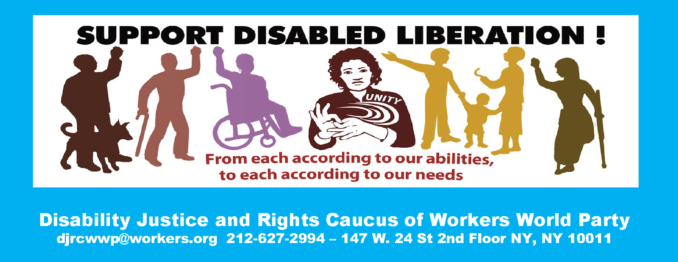Disability justice is a right − and a demand!
Since its founding in 1959, Workers World Party has had a Disability Justice and Rights Caucus. From its beginning there have been WWP comrades who self-identify as people with disabilities.

We totally align ourselves with racial justice, reproductive justice, LGBTQ2S+ justice, women and oppressed genders’ justice, Indigenous peoples’ justice, and we totally embrace the principle of intersectionality — “An injury to one is an injury to all”— in our work.
Our caucus has worked to promote inclusion and access for folks with disabilities, inside and outside the Party, and in the struggle for disabled liberation under our banner “From each according to our abilities, to each according to our needs” — first stated by Karl Marx in 1875. We have attended conferences of disabled peoples’ organizations in socialist countries, including revolutionary Cuba.
One of the former leaders of this caucus was wheelchair user Betsy Gimbel. She was instrumental in helping make the May 3, 1981, March on the Pentagon — 100,000-strong against war, racism and cutbacks — one of the first accessible demonstrations in the history of the U.S. anti-war movement.
The Disability Justice and Rights Caucus meets by Zoom every second Sunday, covering topics like the struggle to stop New York State from sending children with disabilities to the Judge Rotenberg Center in Massachusetts, to be punished and shocked with the “graduated electronic decelerator.” We support the unconditional right of all people of all disabilities to good-paying jobs, sufficient health care and other benefits, full access and independence.
We relate these rights to the righteous struggle of all workers with and without disabilities for a union, including the current organizing at Amazon and Starbucks. And we fight against the disproportionate killing of people with disabilities in the U.S. by police, especially of disabled people of color and those with neurodivergent and emotional disabilities.
Coming up!
You are invited to our next 2nd Sunday Disability Justice Dialogue on Nov. 13 at 7:00 p.m. EDT. You can access the zoom link and numbers by emailing us at djrcwwp@workers.org.
In that Dialogue, we will be commemorating the upcoming 30th International Day of Persons with Disabilities on Dec. 3. The worldwide struggle by people with disabilities for equal rights led the United Nations to establish the IDPD on Dec. 3, 1992.
The Convention on the Rights of Persons with Disabilities was adopted by the U.N. in 2006. Some 177 countries have ratified it — but not the United States, which has failed to ratify human rights treaties defending women, children, migrant workers and Indigenous peoples.
The CRPD — unlike the Americans with Disabilities Act — does not include any specific or limited definition of disability nor require medical proof. It mandates for disability community advances in human, social and economic development and for the abolition of poverty.
The CRPD makes the entire state apparatus, and not just the individual employer or landlord, responsible for providing access. Unlike the ADA, the cost of such access is not restricted to what is “reasonable” or inexpensive. The language of the CRPD affirms the right of all people with disabilities to live in the community and have sufficient support to guarantee such independence.
On December 2, Parents to Improve School Transportation (P.I.S.T.) will be making a musical statement in support of the CRPD and the Conventions on the Rights of the Child in an all-day hybrid global music party for the International Day of Persons with Disabilities. There will be an in-person event from 10 a.m. to 12:00 p.m. at the U.N. at Dag Hammarskjold Plaza, 47th Street at First Avenue, New York City, and then virtually over the next 10 hours. Details are at pistnyc.org/events/globalmusic4idpd.
In New York City, the Peoples Power Assemblies plan to organize their seventh consecutive annual protest for IDPD on December 3 with more information and locations and times to be announced.

